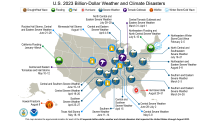The deadly firestorm in Hawaii and Hurricane Idalia's watery storm surge helped push the United States to a record for the number of weather disasters that cost $1 billion or more. And there's still four months to go on what's looking more like a calendar of calamities.
The National Oceanic and Atmospheric Administration announced Monday that there have been 23 weather extreme events in America that cost at least $1 billion this year through August, eclipsing the year-long record total of 22 set in 2020. So far this year's disasters have cost more than $57.6 billion and claimed at least 253 lives.
And NOAA's count doesn't yet include Tropical Storm Hilary's damages in hitting California and a deep drought that has struck the South and Midwest because those costs are still be totaled, said Adam Smith, the NOAA applied climatologist and economist who tracks the billion-dollar disasters.

“We're seeing the fingerprints of climate change all over our nation,” Smith said in an interview Monday. “I would not expect things to slow down anytime soon.”
NOAA has been tracking billion-dollar weather disasters in the United States since 1980 and adjusts damage costs for inflation. What's happening reflects a rise in the number of disasters and more areas being built in risk-prone locations, Smith said.
“Exposure plus vulnerability plus climate change is supercharging more of these into billion-dollar disasters,” Smith said.
U.S. & World
NOAA added eight new billion-dollar disasters to the list since its last update a month ago. In addition to Idalia and the Hawaiian firestorm that killed at least 115 people, NOAA newly listed an Aug. 11 Minnesota hailstorm; severe storms in the Northeast in early August; severe storms in Nebraska, Missouri, Illinois, Indiana and Wisconsin in late July; mid-July hail and severe storms in Michigan, Wisconsin, Ohio, Tennessee and Georgia; deadly flooding in the Northeast and Pennsylvania in the second week of July; and a late June outbreak of severe storms in Missouri, Illinois and Indiana.
“This year a lot of the action has been across the center states, north central, south and southeastern states,” Smith said.
Experts say the United States has to do more to adapt to increased disasters because they will only get worse.
“The climate has already changed and neither the built environment nor the response systems are keeping up with the change,” said former Federal Emergency Management Agency director Craig Fugate, who wasn’t part of the NOAA report.
The increase in weather disasters is consistent with what climate scientists have long been saying, along with a possible boost from a natural El Nino, University of Arizona climate scientist Katharine Jacobs said.
“Adding more energy to the atmosphere and the oceans will increase intensity and frequency of extreme events,” said Jacobs, who was not part of the NOAA report. “Many of this year's events are very unusual and in some cases unprecedented.”
Smith said he thought the 2020 record would last for a long time because the 20 billion-dollar disasters that year smashed the old record of 16.
It didn't, and now he no longer believes new records will last long.
Stanford University climate scientist Chris Field called the trend in billion-dollar disasters “very troubling.”
“But there are things we can do to reverse the trend," Field said. "If we want to reduce the damages from severe weather, we need to accelerate progress on both stopping climate change and building resilience.”



